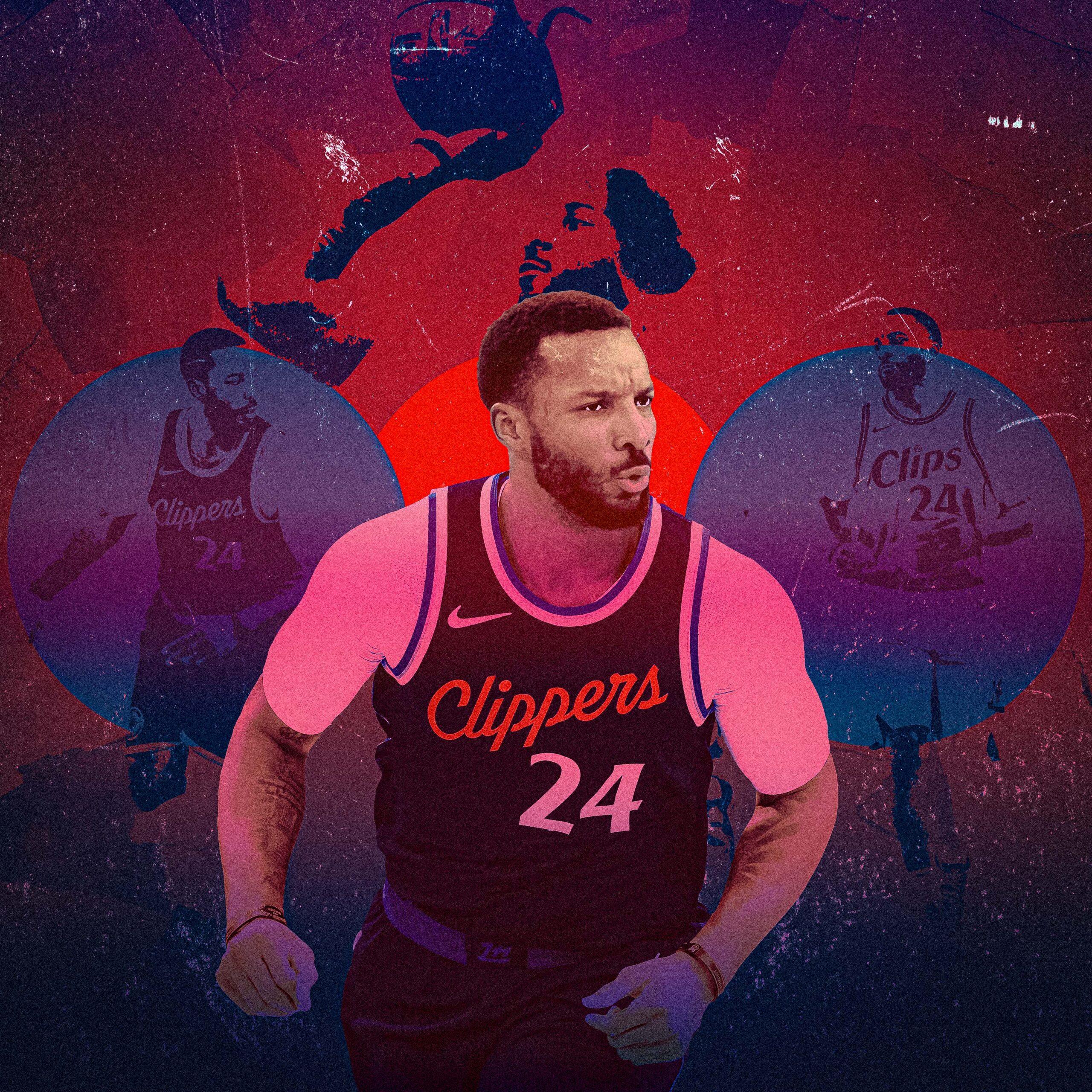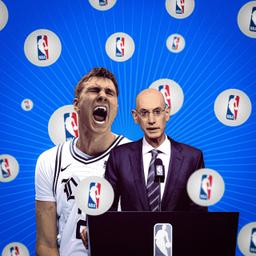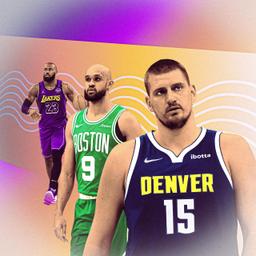
NBA players typically don't experience career years after celebrating their 31st birthday. But Norm Powell, in a season that’s defied just about all forms of conventional wisdom, is an exception to that rule.
As the leading scorer on a plucky playoff team that employs two future Hall of Famers and lost a third in free agency over the summer, Powell’s rise is one of the most important, compelling, and unexpected developments in the entire league. His scoring bona fides are well established—he spent the past two seasons as a Sixth Man of the Year candidate—but no one expected Powell to be averaging more points per game than Steph Curry, Donovan Mitchell, and Jaylen Brown heading into the All-Star break, with one of the highest true shooting percentages in basketball. For the entire season, zero regular players have seen a bigger increase in true usage percentage than Powell, whose minutes, touches, and pick-and-roll frequency are all up significantly since he became the Los Angeles Clippers’ starting 2 guard.
NBA players who suddenly take on more responsibility typically become less efficient, but despite his degree of difficulty going up this season, Powell’s metrics haven’t leveled off. He’s tied for a team-high 22.6 points per game (up from last year’s 13.9), and his true shooting is basically identical to what it was last year despite a significant drop in the rate of his shots that are assisted and an increase in the percentage of his shots that are contested.
Coming into 2024-25, Powell had never scored 20 or more points in more than five straight games. This season, he’s had separate streaks of six, 10, and 11 games. Last year, in crunch time, Powell’s usage rate was 14.7 percent, and his true shooting was 71.9 percent. This year, his usage rate is 29.4 percent, and his true shooting is … 72.6 percent. None of this is normal, yet none of it surprises him. “Everybody’s so shocked or surprised or asking, like, how this career year has happened,” he tells me. “But honestly, I think it’s just been the opportunity. The preparation and being ready for it has always been there.”
It’s a remarkable show of resiliency from a player who was selected 46th in the 2015 NBA draft (the 14 players selected after Powell have combined to score 60 points; Powell has 8,005). He’s long been a precise, dependable scorer, and in Toronto and Portland, he flashed signs that a season resembling this one might be possible. But to boost his individual production and fuel winning on a team that was projected to finish 12th (but is currently sixth) in the West is, with respect, an NBA fairy tale.
That doesn’t mean Powell won’t acknowledge the numerous challenges that come with life as a primary bucket-getter; the toll that burden can have on a player’s mind and body is impossible to prepare for. Powell remembers his first season on the Raptors, sitting on the bench, watching DeMar DeRozan capably manage an immense load night in and night out. At the time, Powell conferred with fellow rookie Delon Wright about how he could be a go-to option someday.
“Man, this is easy,” Powell remembers saying. “I can do that.” The thought lingered for nearly a decade as he slid into different supporting roles alongside superstars like Kawhi Leonard, Damian Lillard, and Paul George. Reality hits different than a daydream, though. “But then actually being in the moment and being that guy that’s relied upon every single night to go out there and produce and know you need to play well to win is totally different than what I expected,” Powell says.
Yet Powell has hit the ground running. From opening night to January 1, he averaged 24.3 points while drilling an obscene 45.1 percent of the 8.3 3-pointers he launched per game. Throughout that stretch—Leonard didn’t make his season debut until January 4—Powell was also a focal point on every defense’s scouting report, getting treated like All-Stars do. According to BBall Index, he’s seen a higher rise in the “guarded by matchup difficulty” stat this season than any other player in the league, going from the 37th percentile to the 85th percentile (minimum 1,000 minutes).
It’s more than having to face tougher individual defenders, though. The general way opponents treat him has completely changed, too. “I think that’s been the funnest part about this year, is just seeing the different coverages that teams have been throwing at me,” Powell says. “The top locks, the full-body denials, not helping off of me, not rotating off of me like they were doing in previous years.”
His All-Star teammate, James Harden, knows better than just about anyone in the league what it feels like to have the kitchen sink thrown at you. And he’s seen Powell respond in ways that help the team. “When you get the opportunity, you get reps, and when you’re scoring efficiently, defenses have to throw different coverages at you,” Harden told The Athletic. “So he’s seeing different coverages, and he’s making the right play. ... When he gets into the paint, he sees where the help is coming from because they are trying to double-team him.”
Being in the moment and being that guy that’s relied upon every single night to go out there and produce and know you need to play well to win is totally different than what I expected.Norm Powell
Powell smiles thinking about the first time he heard an opposing coach yell at one of his players to completely ignore the ball and face guard the Clippers wing instead. His confidence soared as Ty Lue expanded his notoriously dense playbook with counters that would free Powell up without necessarily complicating where his shots came from.
And then there’s the one-on-one film study he does throughout the season with AJ Diggs, a trainer who’s worked with Powell for over 10 years. The two anticipate upcoming defensive schemes and strategize different ways to beat them. They know which teams are likely to top-lock Powell coming out of the corner (like the Golden State Warriors) and which players might face-guard him full court (like Grizzlies rookie Jaylen Wells).
“Trying to stay ahead of the defense has been a big key for us this year,” Diggs tells me. “The film will tell us a ton of things we need to prepare for. Are teams sending you left, are teams sending you right in pick-and-rolls? Everybody kind of knows some of his actions, so if you’ve watched previous years, you’ll see on some of the away actions he’s kind of fought against the top lock. Now he’s just going up the middle.”
And then there’s the perennial green light in the open floor, where Powell has been instructed to be more aggressive than ever before. “I’m taking a transition 3 with two guys back, and it’s just me, and the coach is telling me that’s a good shot and what they’re looking for,” he says. “I think that’s been a lot of fun as well and different for me.”
The result is a player who can be the best version of himself without having to venture too far outside his comfort zone. There are 105 guards who’ve logged at least 2,000 total touches this season; by a decent margin, Powell’s .52 points per touch rank first. By mixing the sound design within Norm’s game, the Clippers coaching staff discovered a way to turn the volume all the way up without damaging any speakers.
In September, Powell stirred the pot by referring to George’s departure as “addition by subtraction,” a bold proclamation that’s come true for him and several teammates. But Powell has always seen himself as a player worthy of a starting role and the duties that come with it. One of his biggest gifts is his open mind. Powell spent a good chunk of his summer in Europe, vacationing in Croatia and attending Paris Fashion Week. Days began in the gym with a workout, but he also carved out enough time to try Reiki treatments and devour books like The Power of Now, Becoming Supernatural, and The Stoic Way of Life. Whatever can help him round out a better version of himself, he’s willing to try.
He knew his conditioning would be vital this season—considering the natural assumption that he’d get more minutes on a team that just hired Jeff Van Gundy to amp up the defense. But he also wanted to perfect one of the best jump shots in the world. Several times a week, Powell completed a drill called “36” that Diggs learned from Lillard’s trainer, in which the player rotates around five different spots behind the arc and shoots at each one until he misses. The exercise is designed to instill consistency and encourage a short-term memory. The goal, obviously, is to reach 36. Powell’s personal high is 92.
“I don’t think for him it’s been this ‘Oh, well, now PG is gone, let’s transform how we work out to be a starter,’” Diggs says. “We’ve been working this way for seven, eight years since he finally cracked the rotation. There was no change because of PG leaving. I think people questioned, ‘Would he be able to do it on volume?’ and the answer has been a resounding yes.”
Powell takes pride in being a steady hand for the Clippers, staying even-keeled by avoiding the mental traps most players get caught in over the course of a game. Much of that comes from conversations with his mental health coach, David Nurse (Nick Nurse’s nephew), about compartmentalizing his job and his life outside it. The two started working together seven years ago, when on-court struggles in Powell’s third season negatively affected his psyche. “I was really depressed,” he says. The mindfulness that’s come out of that experience has its own benefits. “I think just being able to mentally stay in the moment and just go with the ebbs and flows and not getting too high or getting too low has been the biggest thing and biggest adjustment for me,” he says. “You don’t want to be too high and think you’re about to have a career game because you go 5-for-5 in the first quarter. … Just riding the wave and being steady and just believing and having a positive outlook no matter what the situation is.”
At the same time, Powell is a perfectionist. After scoring a season-high 41 points in a road win against the Utah Jazz on February 13, the conversation he had with Diggs was mostly about why he didn’t score 50. “We’re talking about the plays that we missed instead of the plays that we know that we make on a nightly basis,” Diggs says. “It’s not really a celebration of a good game. It’s: How do we squeeze every last drop of potential out of every game?”
I met Norm the next day in downtown San Francisco, where he flew to participate in the 3-point contest. It felt more like a consolation prize than a coronation, though, given how solid his case to make the All-Star team had been. As we walked to his car, down the Moscone Center’s back hallways, our interview was interrupted several times by supporters who wanted to let him know they thought he had been snubbed.
You don’t want to be too high and think you’re about to have a career game because you go 5-for-5 in the first quarter. … Just riding the wave and being steady and just believing and having a positive outlook no matter what the situation is.Norm Powell
WNBA star and ESPN basketball analyst Chiney Ogwumike walked up and gave Powell a hug. “Bro, congrats on a tremendous season. Forty-piece last night. Did you even sleep?” A couple minutes later, Metta Sandiford-Artest sauntered over to ask a series of unambiguous, borderline intrusive, and fully entertaining questions only he could ask. “You an All-Star this year? What you averaging, 20 points a game? I was looking at the stats. I was like shit.” Powell grinned, and Sandiford-Artest kept going. “This your 10th year? You’re in your prime. You’re in your fucking bag! Is this a contract year? How long is your deal? So you’re about to get another bag then.”
Powell politely chuckled along and took it all in stride. Despite being constantly reminded that he did not, in fact, fulfill a lifelong goal and make the All-Star team, he looked genuinely appreciative to hear so many people say he deserved a spot. “I feel like I was playing at an All-Star level. I feel like I should have been there,” he tells me. “I think it is extra motivation for next year in terms of All-Star, but, you know, the focus is winning the championship. That’s the main goal.”
After the All-Star break, Powell missed 12 of L.A.’s first 13 games with left patellar tendinopathy (more commonly known as jumper’s knee) and a strained hamstring. In his last five games, as he has worked his way back onto a team that’s trying to assimilate several new pieces, Powell’s numbers have been down across the board: 12 points in 26 minutes per game with a true shooting percentage that’s below league average. But going forward, the Clippers don’t necessarily need Powell to be who he was before the break. He already saved their season by peaking when they needed him the most while proving to the rest of the league just how dangerous he can be in a much more prominent role.
There’s no reason to think he can’t still be a paragon of efficiency, with a game that has no fat. Powell doesn’t over-dribble or settle for shots outside his expertise, harnessing a skill set that’s adaptable, complementary, and easily scaled in any direction, pending how many scorers are surrounding him. With Leonard looking like an All-NBA force once again, Powell’s numbers are unlikely to pop back up to where they were, but his value is still found in contributions that are more clinical than self-indulgent—the snappy decisions of a running back who knows his offensive line can’t keep the hole open. He can attack hard closeouts, get more open catch-and-shoot looks, and, for stretches, be the third star L.A. didn’t know it had. As one of the sport’s great movement shooters, Powell supplies the type of gravity that can make him even more useful without the ball.
If healthy, this iteration of the Clippers will enter the playoffs with just about every ingredient necessary to contend for a title. They have experience, depth, playmaking, rim protection, outside shooting, versatility, rebounding, and some of the most accomplished problem solvers in basketball. With a bit of luck (like playing the Rockets instead of the Thunder in Round 1), L.A. has a path to enjoy more success than virtually everyone thought it would before the season started.
“I think a deep playoff run and a championship is not too crazy to say. I think we can take this however high we want to,” Powell says. “When I first came to the Clippers, people were like, ‘Oh, you want to be an All-Star, great, big aspirations, role player.’ I’ve always seen myself being able to play at this level, but I’m focused on a championship now, and that’s my motivation to go out there and get that. Then I’ll be able to talk a little more.”





